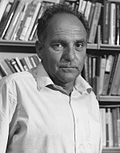Ernest André Gellner FRAI (9 December 1925 – 5 November 1995) was a British-Czech philosopher and social anthropologist described by The Daily Telegraph...
26 KB (2,697 words) - 09:14, 4 October 2024
Gellner's theory of nationalism was developed by Ernest Gellner over a number of publications from around the early 1960s to his 1995 death. Gellner discussed...
10 KB (1,173 words) - 01:14, 26 September 2024
nationalism. Prominent modernization scholars, such as Benedict Anderson, Ernest Gellner and Eric Hobsbawm, say nationalism arose with modernization during the...
16 KB (1,935 words) - 10:08, 23 October 2024
Origins of society (section Ernest Gellner)
suppress deviant behaviour. Human beings, writes social anthropologist Ernest Gellner, are not genetically programmed to be members of this or that social...
38 KB (5,534 words) - 18:46, 7 July 2024
National identity (section Ernest Gellner)
pressures. Unlike Benedict Anderson, Gellner thought nations were not "imagined communities". In his book, Ernest Gellner explained how he thought nations...
39 KB (4,252 words) - 15:11, 7 September 2024
Gellner is a Jewish surname, that may refer to: Ernest Gellner (1925–1995), British philosopher František Gellner (1881–1914), Czech writer Julius Gellner...
407 bytes (73 words) - 14:54, 20 September 2023
Sociology of religion (section Ernest Gellner)
location that it occupied in pre-modern times. Unlike Wilson and Weber, Ernest Gellner (1974) acknowledges that there are drawbacks to living in a world whose...
56 KB (7,177 words) - 19:33, 9 October 2024
Nations and Nationalism (book) (category Books by Ernest Gellner)
by the philosopher Ernest Gellner, in which the author expands on his theory of nationalism. O'Leary describes the book as "Gellner's most elaborate statement...
2 KB (196 words) - 08:50, 25 January 2023
(Oxford 1996), "Introduction", 8–9 Gellner, Ernest (1983) Nations and Nationalism. Oxford: Blackwell. Ernest Gellner (1997) Nationalism. London: Weidenfeld...
87 KB (10,126 words) - 19:14, 26 October 2024
be applied to other bodies of knowledge or learning, for example by Ernest Gellner to Marxism. Vincent Barry explains the difference between philosophy...
4 KB (445 words) - 13:12, 5 November 2023
the sense of wholeness it once provided, to a disenchanted modernity. Ernest Gellner argued that, although disenchantment was the inevitable product of modernity...
11 KB (1,125 words) - 23:25, 20 October 2024
Thought and Change (category Books by Ernest Gellner)
Thought and Change is a 1964 book by the philosopher Ernest Gellner, in which the author outlines his views on "modernity" and looks at the processes of...
2 KB (226 words) - 01:05, 27 August 2024
rhetorical analysis, where criticism is the second-best thing I do." Ernest Gellner, in his book review titled "The Mightier Pen? Edward Said and the Double...
58 KB (6,950 words) - 23:46, 11 October 2024
social anthropology at Cambridge University, working with Jack Goody and Ernest Gellner. In 1986 she received her PhD for work on modern-day witches in England...
10 KB (962 words) - 14:37, 3 January 2024
hegemony upon society. For the Orientalist Ernest Renan and for the rationalist philosopher Ernest Gellner, high culture was conceptually integral to...
24 KB (2,957 words) - 20:45, 26 October 2024
greatest political theorists. The British philosopher-anthropologist Ernest Gellner considered Ibn Khaldun's definition of government, "an institution which...
20 KB (2,486 words) - 01:15, 25 October 2024
philosopher and social scientist Ernest Gellner. Julius Gellner was the ninth child of Anna (née Löbl) and Max Gellner. The family later moved from Saaz...
2 KB (223 words) - 22:39, 20 August 2024
into the "historicist" or "modernist" school of nationalism along with Ernest Gellner and Eric Hobsbawm in that he posits that nations and nationalism are...
11 KB (1,460 words) - 01:55, 14 October 2024
matchlock musket, cannon, and the arquebus over traditional weapons. Ernest Gellner in his book 'Nations and Nationalism' argues that the centralizing potential...
157 KB (21,542 words) - 11:58, 22 October 2024
right, and it was rubbish, which indeed it is." — Ernest Gellner, Interview with John Davis, 1991 Gellner criticized ordinary language philosophy in his...
17 KB (1,946 words) - 03:24, 19 October 2024
"general critique of gradualism" in the twentieth century. Anthropologist Ernest Gellner proposed a neo-episodic model of change in 1964 that highlights the...
69 KB (9,309 words) - 12:37, 24 July 2024
period. Jayasthiti Malla (1382–1395) categorised Newars into 64 castes (Gellner 2001). A similar exercise was made during the reign of Mahindra Malla (1506–1575)...
108 KB (12,716 words) - 18:22, 14 October 2024
for the Study of Nationalism, CEU (Prague)- where he worked with late Ernest Gellner -, and at the University of Galway. He also held visiting professorships...
11 KB (886 words) - 16:15, 30 September 2024
another, in a continuous cycle. The British philosopher-anthropologist Ernest Gellner considered Ibn Khaldun's definition of government, "an institution which...
43 KB (5,177 words) - 10:02, 22 October 2024
authors, books and articles. Philosopher and social anthropologist Ernest Gellner criticized Said for "exploiting Western guilt about imperialism." Said...
12 KB (1,349 words) - 22:49, 27 January 2024
p. 280. ISBN 978-0-415-29796-7. Malešević, Siniša; et al. (2007). Ernest Gellner and Contemporary Social Thought. Cambridge University Press. p. 189...
42 KB (4,885 words) - 03:41, 4 November 2024
stereotypical development of nationalism in 19th-century Eastern Europe, by Ernest Gellner in Nations and Nationalism, in a pastiche of the historical narratives...
9 KB (1,019 words) - 11:42, 15 August 2024
2006), chapter 10, part VIII. K. R. Popper, 1945:199–200 Wilson, p. 403 Ernest Gellner, Nationalism (1997), pp. 25–29 M. Hardt/K. Weeks, The Jameson Reader...
11 KB (1,404 words) - 12:13, 22 October 2024
differs from contextualism, invariantism, and Schaffer's contrastivism. Ernest Gellner in Words and Things "terms derive their meaning from the fact that there...
3 KB (298 words) - 22:25, 27 April 2024
greatest political theorists. The British philosopher-anthropologist Ernest Gellner considered Ibn Khaldun's definition of government, "an institution which...
124 KB (15,986 words) - 15:51, 3 November 2024










